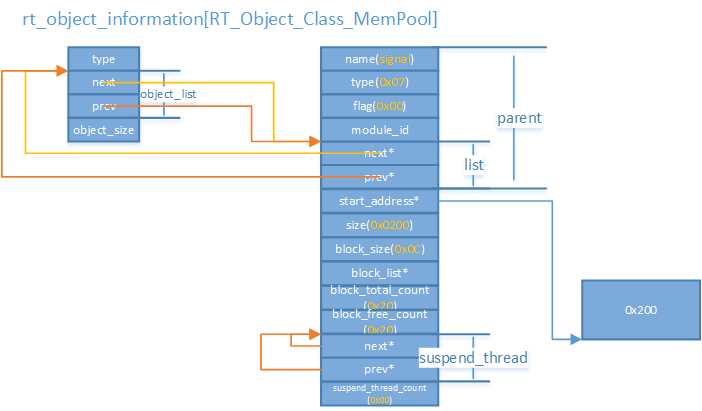1. rt_system_signal_init source
int rt_system_signal_init(void)
{
_rt_siginfo_pool = rt_mp_create("signal", RT_SIG_INFO_MAX, sizeof(struct siginfo_node));
if (_rt_siginfo_pool == RT_NULL)
{
dbg_log(DBG_ERROR, "create memory pool for signal info failed.\n");
RT_ASSERT(0);
}
return 0;
}
2. rt_system_signal_init analysis
1. siginfo_node structure collation

2. rt_mp_create analysis
0, Source Code
rt_mp_t rt_mp_create(const char *name, // "signal"
rt_size_t block_count, // RT_SIG_INFO_MAX
rt_size_t block_size) // sizeof(struct siginfo_node)
{
rt_uint8_t *block_ptr;
struct rt_mempool *mp;
register rt_size_t offset;
RT_DEBUG_NOT_IN_INTERRUPT;
/* allocate object */
mp = (struct rt_mempool *)rt_object_allocate(RT_Object_Class_MemPool, name);
/* allocate object failed */
if (mp == RT_NULL)
return RT_NULL;
/* initialize memory pool */
block_size = RT_ALIGN(block_size, RT_ALIGN_SIZE);
mp->block_size = block_size;
mp->size = (block_size + sizeof(rt_uint8_t *)) * block_count;
/* allocate memory */
mp->start_address = rt_malloc((block_size + sizeof(rt_uint8_t *)) *
block_count);
if (mp->start_address == RT_NULL)
{
/* no memory, delete memory pool object */
rt_object_delete(&(mp->parent));
return RT_NULL;
}
mp->block_total_count = block_count;
mp->block_free_count = mp->block_total_count;
/* initialize suspended thread list */
rt_list_init(&(mp->suspend_thread));
mp->suspend_thread_count = 0;
/* initialize free block list */
block_ptr = (rt_uint8_t *)mp->start_address;
for (offset = 0; offset < mp->block_total_count; offset ++)
{
*(rt_uint8_t **)(block_ptr + offset * (block_size + sizeof(rt_uint8_t *)))
= block_ptr + (offset + 1) * (block_size + sizeof(rt_uint8_t *));
}
*(rt_uint8_t **)(block_ptr + (offset - 1) * (block_size + sizeof(rt_uint8_t *)))
= RT_NULL;
mp->block_list = block_ptr;
return mp;
}
RTM_EXPORT(rt_mp_create);
1. rt_mempool structure collation
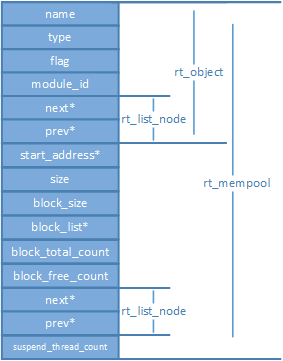
2,rt_object_allocate
// type - RT_Object_Class_MemPool
// name - "signal"
rt_object_t rt_object_allocate(enum rt_object_class_type type, const char *name)
{
struct rt_object *object;
register rt_base_t temp;
struct rt_object_information *information;
#ifdef RT_USING_MODULE
struct rt_dlmodule *module = dlmodule_self();
#endif
RT_DEBUG_NOT_IN_INTERRUPT;
/* get object information */
information = rt_object_get_information(type);
RT_ASSERT(information != RT_NULL);
object = (struct rt_object *)RT_KERNEL_MALLOC(information->object_size);
if (object == RT_NULL)
{
/* no memory can be allocated */
return RT_NULL;
}
/* clean memory data of object */
rt_memset(object, 0x0, information->object_size);
/* initialize object's parameters */
/* set object type */
object->type = type;
/* set object flag */
object->flag = 0;
/* copy name */
rt_strncpy(object->name, name, RT_NAME_MAX);
RT_OBJECT_HOOK_CALL(rt_object_attach_hook, (object));
/* lock interrupt */
temp = rt_hw_interrupt_disable();
#ifdef RT_USING_MODULE
if (module)
{
rt_list_insert_after(&(module->object_list), &(object->list));
object->module_id = (void *)module;
}
else
#endif
{
/* insert object into information object list */
rt_list_insert_after(&(information->object_list), &(object->list));
}
/* unlock interrupt */
rt_hw_interrupt_enable(temp);
/* return object */
return object;
}
1,rt_object_get_information
information = rt_object_get_information(type);
Equivalent to
information = rt_object_get_information(RT_Object_Class_MemPool);

2,RT_KERNEL_MALLOC
#define RT_KERNEL_MALLOC(sz) rt_malloc(sz)
void *rt_malloc(rt_size_t size)
{
rt_size_t ptr, ptr2;
struct heap_mem *mem, *mem2;
RT_DEBUG_NOT_IN_INTERRUPT;
if (size == 0)
return RT_NULL;
// RT_ALIGN - Returns the minimum size of the specified width
if (size != RT_ALIGN(size, RT_ALIGN_SIZE))
RT_DEBUG_LOG(RT_DEBUG_MEM, ("malloc size %d, but align to %d\n",
size, RT_ALIGN(size, RT_ALIGN_SIZE)));
else
RT_DEBUG_LOG(RT_DEBUG_MEM, ("malloc size %d\n", size));
/* alignment size */
size = RT_ALIGN(size, RT_ALIGN_SIZE);
// mem_size_aligned is initialized with an initial value of SRAM free space
if (size > mem_size_aligned)
{
RT_DEBUG_LOG(RT_DEBUG_MEM, ("no memory\n"));
return RT_NULL;
}
// Minimum Allocated Memory
/* every data block must be at least MIN_SIZE_ALIGNED long */
if (size < MIN_SIZE_ALIGNED)
size = MIN_SIZE_ALIGNED;
/* take memory semaphore */
rt_sem_take(&heap_sem, RT_WAITING_FOREVER);
// lfree equals heap_ptr, ptr indicates the size of space used
for (ptr = (rt_uint8_t *)lfree - heap_ptr;
ptr < mem_size_aligned - size;
ptr = ((struct heap_mem *)&heap_ptr[ptr])->next)
{
mem = (struct heap_mem *)&heap_ptr[ptr];
// Mem->next - (ptr + SIZEOF_STRUCT_MEM) >= size means that after allocation, one more can be allocated
if ((!mem->used) && (mem->next - (ptr + SIZEOF_STRUCT_MEM)) >= size)
{
/* mem is not used and at least perfect fit is possible:
* mem->next - (ptr + SIZEOF_STRUCT_MEM) gives us the 'user data size' of mem */
// Mem->next - (ptr + SIZEOF_STRUCT_MEM) represents the remaining space after allocation
if (mem->next - (ptr + SIZEOF_STRUCT_MEM) >=
(size + SIZEOF_STRUCT_MEM + MIN_SIZE_ALIGNED))
{
/* (in addition to the above, we test if another struct heap_mem (SIZEOF_STRUCT_MEM) containing
* at least MIN_SIZE_ALIGNED of data also fits in the 'user data space' of 'mem')
* -> split large block, create empty remainder,
* remainder must be large enough to contain MIN_SIZE_ALIGNED data: if
* mem->next - (ptr + (2*SIZEOF_STRUCT_MEM)) == size,
* struct heap_mem would fit in but no data between mem2 and mem2->next
* @todo we could leave out MIN_SIZE_ALIGNED. We would create an empty
* region that couldn't hold data, but when mem->next gets freed,
* the 2 regions would be combined, resulting in more free memory
*/
ptr2 = ptr + SIZEOF_STRUCT_MEM + size;
/* create mem2 struct */
mem2 = (struct heap_mem *)&heap_ptr[ptr2];
mem2->magic = HEAP_MAGIC;
mem2->used = 0;
mem2->next = mem->next;
mem2->prev = ptr;
#ifdef RT_USING_MEMTRACE
rt_mem_setname(mem2, " ");
#endif
/* and insert it between mem and mem->next */
mem->next = ptr2;
mem->used = 1;
if (mem2->next != mem_size_aligned + SIZEOF_STRUCT_MEM)
{
((struct heap_mem *)&heap_ptr[mem2->next])->prev = ptr2;
}
#ifdef RT_MEM_STATS
used_mem += (size + SIZEOF_STRUCT_MEM);
if (max_mem < used_mem)
max_mem = used_mem;
#endif
}
else
{
/* (a mem2 struct does no fit into the user data space of mem and mem->next will always
* be used at this point: if not we have 2 unused structs in a row, plug_holes should have
* take care of this).
* -> near fit or excact fit: do not split, no mem2 creation
* also can't move mem->next directly behind mem, since mem->next
* will always be used at this point!
*/
mem->used = 1;
#ifdef RT_MEM_STATS
used_mem += mem->next - ((rt_uint8_t *)mem - heap_ptr);
if (max_mem < used_mem)
max_mem = used_mem;
#endif
}
/* set memory block magic */
mem->magic = HEAP_MAGIC;
#ifdef RT_USING_MEMTRACE
if (rt_thread_self())
rt_mem_setname(mem, rt_thread_self()->name);
else
rt_mem_setname(mem, "NONE");
#endif
if (mem == lfree)
{
/* Find next free block after mem and update lowest free pointer */
while (lfree->used && lfree != heap_end)
lfree = (struct heap_mem *)&heap_ptr[lfree->next];
RT_ASSERT(((lfree == heap_end) || (!lfree->used)));
}
rt_sem_release(&heap_sem);
RT_ASSERT((rt_uint32_t)mem + SIZEOF_STRUCT_MEM + size <= (rt_uint32_t)heap_end);
RT_ASSERT((rt_uint32_t)((rt_uint8_t *)mem + SIZEOF_STRUCT_MEM) % RT_ALIGN_SIZE == 0);
RT_ASSERT((((rt_uint32_t)mem) & (RT_ALIGN_SIZE - 1)) == 0);
RT_DEBUG_LOG(RT_DEBUG_MEM,
("allocate memory at 0x%x, size: %d\n",
(rt_uint32_t)((rt_uint8_t *)mem + SIZEOF_STRUCT_MEM),
(rt_uint32_t)(mem->next - ((rt_uint8_t *)mem - heap_ptr))));
RT_OBJECT_HOOK_CALL(rt_malloc_hook,
(((void *)((rt_uint8_t *)mem + SIZEOF_STRUCT_MEM)), size));
/* return the memory data except mem struct */
return (rt_uint8_t *)mem + SIZEOF_STRUCT_MEM;
}
}
rt_sem_release(&heap_sem);
return RT_NULL;
}
Role: Allocate sizeof (struct rt_rt) on the heapMempool) size of space.
0, rt_System_Heap_Heap space after init initialization
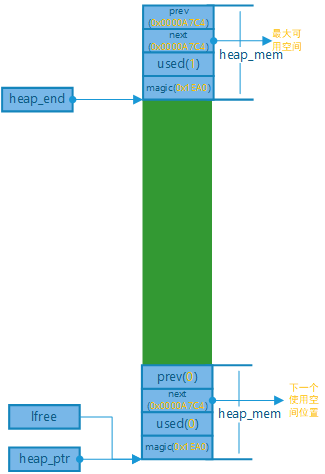
1,RT_ALIGN
/** * @ingroup BasicDef * * @def RT_ALIGN(size, align) * Return the most contiguous size aligned at specified width. RT_ALIGN(13, 4) * would return 16. */ #define RT_ALIGN(size, align) (((size) + (align) - 1) & ~((align) - 1))
Align by specified bytes.
2,mem_size_aligned
Total heap space size.
mem_size_aligned at rt_Hw_Board_Rt_in init functionSystem_Heap_Init initialization.
3,heap_sem
heap_sem in rt_Hw_Board_Rt_in init functionSystem_Heap_Init initialization.Initialized as follows:

4,rt_sem_take
Get the memory semaphore.
rt_err_t rt_sem_take(rt_sem_t sem, rt_int32_t time)
{
register rt_base_t temp;
struct rt_thread *thread;
/* parameter check */
RT_ASSERT(sem != RT_NULL);
RT_ASSERT(rt_object_get_type(&sem->parent.parent) == RT_Object_Class_Semaphore);
RT_OBJECT_HOOK_CALL(rt_object_trytake_hook, (&(sem->parent.parent)));
/* disable interrupt */
temp = rt_hw_interrupt_disable();
RT_DEBUG_LOG(RT_DEBUG_IPC, ("thread %s take sem:%s, which value is: %d\n",
rt_thread_self()->name,
((struct rt_object *)sem)->name,
sem->value));
if (sem->value > 0)
{
/* semaphore is available */
sem->value --;
/* enable interrupt */
rt_hw_interrupt_enable(temp);
}
else
{
/* no waiting, return with timeout */
if (time == 0)
{
rt_hw_interrupt_enable(temp);
return -RT_ETIMEOUT;
}
else
{
/* current context checking */
RT_DEBUG_IN_THREAD_CONTEXT;
/* semaphore is unavailable, push to suspend list */
/* get current thread */
thread = rt_thread_self();
/* reset thread error number */
thread->error = RT_EOK;
RT_DEBUG_LOG(RT_DEBUG_IPC, ("sem take: suspend thread - %s\n",
thread->name));
/* suspend thread */
rt_ipc_list_suspend(&(sem->parent.suspend_thread),
thread,
sem->parent.parent.flag);
/* has waiting time, start thread timer */
if (time > 0)
{
RT_DEBUG_LOG(RT_DEBUG_IPC, ("set thread:%s to timer list\n",
thread->name));
/* reset the timeout of thread timer and start it */
rt_timer_control(&(thread->thread_timer),
RT_TIMER_CTRL_SET_TIME,
&time);
rt_timer_start(&(thread->thread_timer));
}
/* enable interrupt */
rt_hw_interrupt_enable(temp);
/* do schedule */
rt_schedule();
if (thread->error != RT_EOK)
{
return thread->error;
}
}
}
RT_OBJECT_HOOK_CALL(rt_object_take_hook, (&(sem->parent.parent)));
return RT_EOK;
}
RTM_EXPORT(rt_sem_take);

Change only the value of value.
5,heap_ptr
static rt_uint8_t *heap_ptr;
heap_ptr in rt_Hw_Board_Rt_in init functionSystem_Heap_Init initialization.heap_ptr is set at the start of the heap.
6,lfree
static struct heap_mem *lfree;
lfree in rt_Hw_Board_Rt_in init functionSystem_Heap_Init initialization.lfree is set to the heap idle location.
Note:rt_System_Heap_After the init function is initialized, heap_ptr and lfree are equal.
7,size
The size value is equal to sizeof(struct rt_mempool).
8,SIZEOF_STRUCT_MEM
#define SIZEOF_STRUCT_MEM RT_ALIGN(sizeof(struct heap_mem), RT_ALIGN_SIZE)
9,used_mem,max_mem
static rt_size_t used_mem, max_mem;
used_mem: heap usage size
max_mem: heap maximum usage
10. Allocate memory space and initialize
for (ptr = (rt_uint8_t *)lfree - heap_ptr;
ptr < mem_size_aligned - size;
ptr = ((struct heap_mem *)&heap_ptr[ptr])->next)
ptr = (rt_uint8_t *)lfree - heap_ptr:ptr Save heap usage space size.
PTR < mem_Size_Aligned - size: detects if space is allocated enough
PTR = ((struct heap_MEM *) &heap_Ptr[ptr]->next: Points to the next allocated space.
mem = (struct heap_mem *)&heap_ptr[ptr];
heap_ptr is unsigned char pointer, PTR is usage space size, heap_ptr[ptr] is the first unused space.
if ((!mem->used) && (mem->next - (ptr + SIZEOF_STRUCT_MEM)) >= size)
Mem->user represents the usage of this space.0 means unused and 1 means used.
After the heap space is initialized, the last piece of space is set to be used. After initialization, mem->next saves the first address of the last piece of space.
Mem->next - (ptr + SIZEOF_STRUCT_MEM) >= size: Determine if the remaining space is sufficient to allocate SIZEOF_STRUCT_MEM and size.
if (mem->next - (ptr + SIZEOF_STRUCT_MEM) >= (size + SIZEOF_STRUCT_MEM + MIN_SIZE_ALIGNED))
Except to allocate space SIZEOF_STRUCT_Beyond MEM and size, detect if allocated is greater than SIZEOF_STRUCT_MEM + MIN_SIZE_ALIGNED.
ptr2 = ptr + SIZEOF_STRUCT_MEM + size; /* create mem2 struct */ mem2 = (struct heap_mem *)&heap_ptr[ptr2]; mem2->magic = HEAP_MAGIC; mem2->used = 0; mem2->next = mem->next; mem2->prev = ptr;
ptr2: Points to the allocated free header address.
mem2: Initialize the first free heap allocatable space.
mem->next = ptr2;
mem->used = 1;
used_mem += (size + SIZEOF_STRUCT_MEM);
if (max_mem < used_mem)
max_mem = used_mem;
mem->magic = HEAP_MAGIC;
Initialize allocated space.
11. Update lfree pointer
if (mem == lfree)
{
/* Find next free block after mem and update lowest free pointer */
while (lfree->used && lfree != heap_end)
lfree = (struct heap_mem *)&heap_ptr[lfree->next];
RT_ASSERT(((lfree == heap_end) || (!lfree->used)));
}
12,rt_sem_release
rt_err_t rt_sem_release(rt_sem_t sem)
{
register rt_base_t temp;
register rt_bool_t need_schedule;
/* parameter check */
RT_ASSERT(sem != RT_NULL);
RT_ASSERT(rt_object_get_type(&sem->parent.parent) == RT_Object_Class_Semaphore);
RT_OBJECT_HOOK_CALL(rt_object_put_hook, (&(sem->parent.parent)));
need_schedule = RT_FALSE;
/* disable interrupt */
temp = rt_hw_interrupt_disable();
RT_DEBUG_LOG(RT_DEBUG_IPC, ("thread %s releases sem:%s, which value is: %d\n",
rt_thread_self()->name,
((struct rt_object *)sem)->name,
sem->value));
if (!rt_list_isempty(&sem->parent.suspend_thread))
{
/* resume the suspended thread */
rt_ipc_list_resume(&(sem->parent.suspend_thread));
need_schedule = RT_TRUE;
}
else
sem->value ++; /* increase value */
/* enable interrupt */
rt_hw_interrupt_enable(temp);
/* resume a thread, re-schedule */
if (need_schedule == RT_TRUE)
rt_schedule();
return RT_EOK;
}
RTM_EXPORT(rt_sem_release);
Check for pending threads.
Execution result heap_Add 1 to the sem.value value value.
13. Return Heap Allocate Available Space
return (rt_uint8_t *)mem + SIZEOF_STRUCT_MEM;
14. RT_KERNEL_MALLOC execution results
RT_KERNEL_The heap usage after MALLOC execution is as follows:
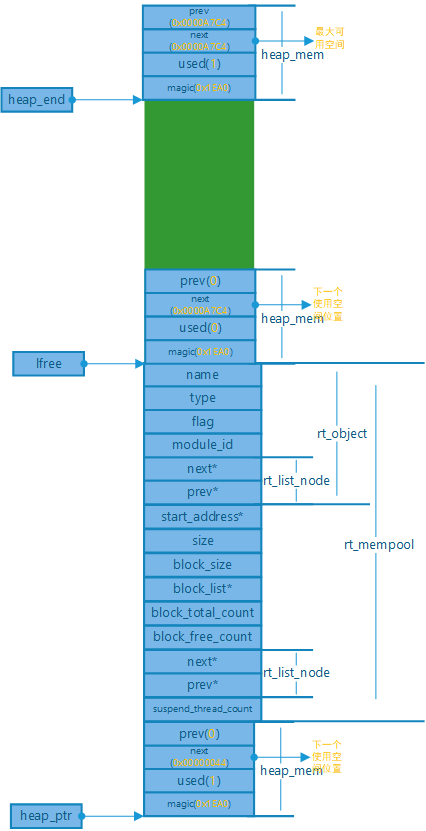
3,rt_memset
void *rt_memset(void *s, int c, rt_ubase_t count)
{
#ifdef RT_USING_TINY_SIZE
char *xs = (char *)s;
while (count--)
*xs++ = c;
return s;
#else
#define LBLOCKSIZE (sizeof(rt_int32_t))
#define UNALIGNED(X) ((rt_int32_t)X & (LBLOCKSIZE - 1))
#define TOO_SMALL(LEN) ((LEN) < LBLOCKSIZE)
int i;
char *m = (char *)s;
rt_uint32_t buffer;
rt_uint32_t *aligned_addr;
rt_uint32_t d = c & 0xff;
if (!TOO_SMALL(count) && !UNALIGNED(s))
{
/* If we get this far, we know that n is large and m is word-aligned. */
aligned_addr = (rt_uint32_t *)s;
/* Store D into each char sized location in BUFFER so that
* we can set large blocks quickly.
*/
if (LBLOCKSIZE == 4)
{
buffer = (d << 8) | d;
buffer |= (buffer << 16);
}
else
{
buffer = 0;
for (i = 0; i < LBLOCKSIZE; i ++)
buffer = (buffer << 8) | d;
}
while (count >= LBLOCKSIZE * 4)
{
*aligned_addr++ = buffer;
*aligned_addr++ = buffer;
*aligned_addr++ = buffer;
*aligned_addr++ = buffer;
count -= 4 * LBLOCKSIZE;
}
while (count >= LBLOCKSIZE)
{
*aligned_addr++ = buffer;
count -= LBLOCKSIZE;
}
/* Pick up the remainder with a bytewise loop. */
m = (char *)aligned_addr;
}
while (count--)
{
*m++ = (char)d;
}
return s;
#undef LBLOCKSIZE
#undef UNALIGNED
#undef TOO_SMALL
#endif
}
RTM_EXPORT(rt_memset);
Clear rt_mempool spatial data, all set to 0.
4. Initialize rt_for allocation spaceObject object
/* set object type */ object->type = type; /* set object flag */ object->flag = 0; /* copy name */ rt_strncpy(object->name, name, RT_NAME_MAX);
5,rt_list_insert_after
Insert Allocation Space into rt_object_information[RT_Object_Class_MemPool].
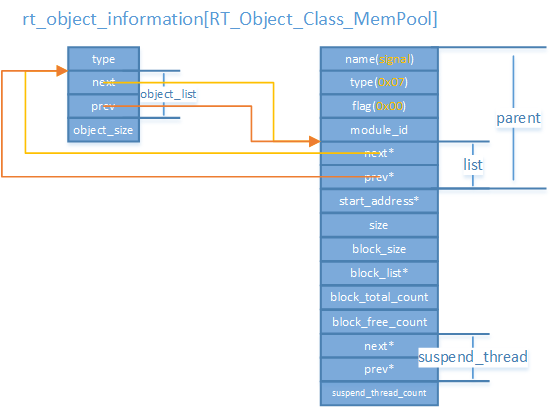
3,mp
mp is rt_Object_The allocate function returns the allocated spatial address.
4. Initialization Data-1
/* initialize memory pool */ block_size = RT_ALIGN(block_size, RT_ALIGN_SIZE); mp->block_size = block_size; mp->size = (block_size + sizeof(rt_uint8_t *)) * block_count;
5,rt_malloc
mp->start_address = rt_malloc((block_size + sizeof(rt_uint8_t *)) *
block_count);
block_size: 0x0000000C
block_count: 0x00000020
6. Initialization data-2
mp->block_total_count = block_count;
mp->block_free_count = mp->block_total_count;
/* initialize suspended thread list */
rt_list_init(&(mp->suspend_thread));
mp->suspend_thread_count = 0;
/* initialize free block list */
block_ptr = (rt_uint8_t *)mp->start_address;
for (offset = 0; offset < mp->block_total_count; offset ++)
{
*(rt_uint8_t **)(block_ptr + offset * (block_size + sizeof(rt_uint8_t *)))
= block_ptr + (offset + 1) * (block_size + sizeof(rt_uint8_t *));
}
*(rt_uint8_t **)(block_ptr + (offset - 1) * (block_size + sizeof(rt_uint8_t *)))
= RT_NULL;
mp->block_list = block_ptr;
3. rt_mp_create execution result
Rt_Mp_When the create execution is complete, the heap allocation is as follows:
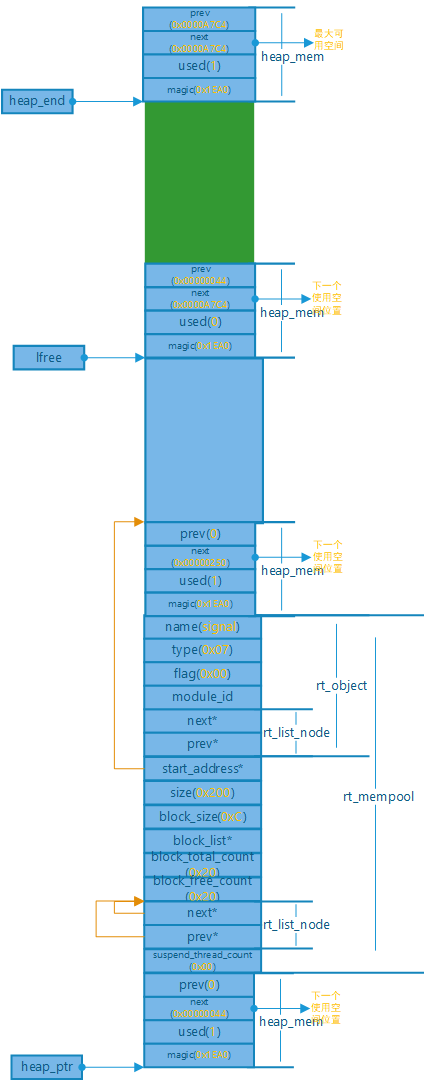
Rt_Object_Information[RT_Object_Class_The MemPool] list is as follows:
